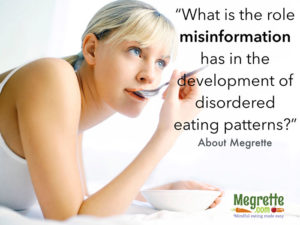 As mentioned, disordered eating isn’t a single behavior or an individual problem but a pattern of thinking and decisions leading to self-harm. At the onset, these thoughts and behaviors appear harmless, and are often praised by society as being “good” or “strong” or even “disciplined” regarding food and eating choices. This truth is clearly described in the Restrictive PRIDE Eating Cycle, where unhealthy restriction is praised due to weight loss or smaller body size. This cycle, a major force in the Thin Ideal, contributes to society’s blindness that small choices over time result in a problem affecting more than 70 million people worldwide!
As mentioned, disordered eating isn’t a single behavior or an individual problem but a pattern of thinking and decisions leading to self-harm. At the onset, these thoughts and behaviors appear harmless, and are often praised by society as being “good” or “strong” or even “disciplined” regarding food and eating choices. This truth is clearly described in the Restrictive PRIDE Eating Cycle, where unhealthy restriction is praised due to weight loss or smaller body size. This cycle, a major force in the Thin Ideal, contributes to society’s blindness that small choices over time result in a problem affecting more than 70 million people worldwide!
To understand how disordered eating begins, I would like to share a fable about two wolves.
A grandfather was talking with his grandson. The grandfather said, “There are two wolves inside of us which are always at war with each other. One of them is a good wolf which represents things like kindness, bravery, and love. The other is a bad wolf, which represents things like greed, hatred, and fear.”
The grandson stopped and thought about the statement for a second, then he looked up at his grandfather and asked, “Grandfather, which one wins?”
The grandfather quietly replied, the one you feed.

Individuals who are using food to cope are in conflict. They are trying to find information supporting the use of these behaviors to cope, while at the exact time, desperately searching for something more effective. Why? Individuals who are suffering from any form of disordered eating know, eating to cope or restricting to cope, is a short-term solution to a chronic condition.
Research supports that misinformation or biased information can feed the “wolf” by praising unhealthy thoughts and behaviors surrounding eating. This “praise” raises self-esteem, reinforcing the cycle of restriction. The other way misinformation or biased information works is by reinforcing the shame, blame, or judgment which initially triggered the eating behavior. Regardless if the misinformation praises unhealthy behavior, or triggers it, the larger underlying issue is how to cope effectively without self-harm.
What can you do? The initial step is to see disordered eating for what it is – coping. The coping began as the compassionate desire to comfort oneself. It is difficult to see disordered eating as a compassionate act, especially when our clients are facing so much suffering.
It is also painful for us to witness their suffering. This pain triggers feelings and fears within us and can make it even more difficult for us to remain nonjudgmental when working with our clients. Our personal pain can trigger counseling situations where we find ourselves frustrated, struggling to listen, or even arguing with a client.
The second thing you can do, is see how misinformation surrounding food, nutrition, health, and weight, feeds the evil wolf and nourishes the fear within a person. Misinformation and weight bias is where disordered eating starts.
The third thing you can do is to challenge your own views, thoughts, and ideas about information. Is the data accurate or just familiar? Is the information helpful, promoting flexibility, enjoyment, and satisfaction surrounding food? If it is not, why are you encouraging this view?
The final thing you can do is find some professionals who passionately believe differently than you. In the book, Originals, by Adam Grant, PhD research shows being around people who genuinely believe differently than you will expand your view point and improve outcomes! There are a number of these diverse thinkers in the nutrition community, and I would encourage you to check out “Mindful Dietitian” (Facebook) or “Food Psych” (Podcast), or “Health at Every Size” (Website).
In the next post, I will continue to explore how misinformation promotes disordered eating. Sign up for Megrette.com newsletter, “Oh, That Will Work!.” Join me on Facebook, Twitter, and in my next Core Concepts of Mindful Eating Live training in January or March!
By Megrette Fletcher M.Ed., RD, CDE
Author of Core Concepts of Mindful Eating: Professional Edition

